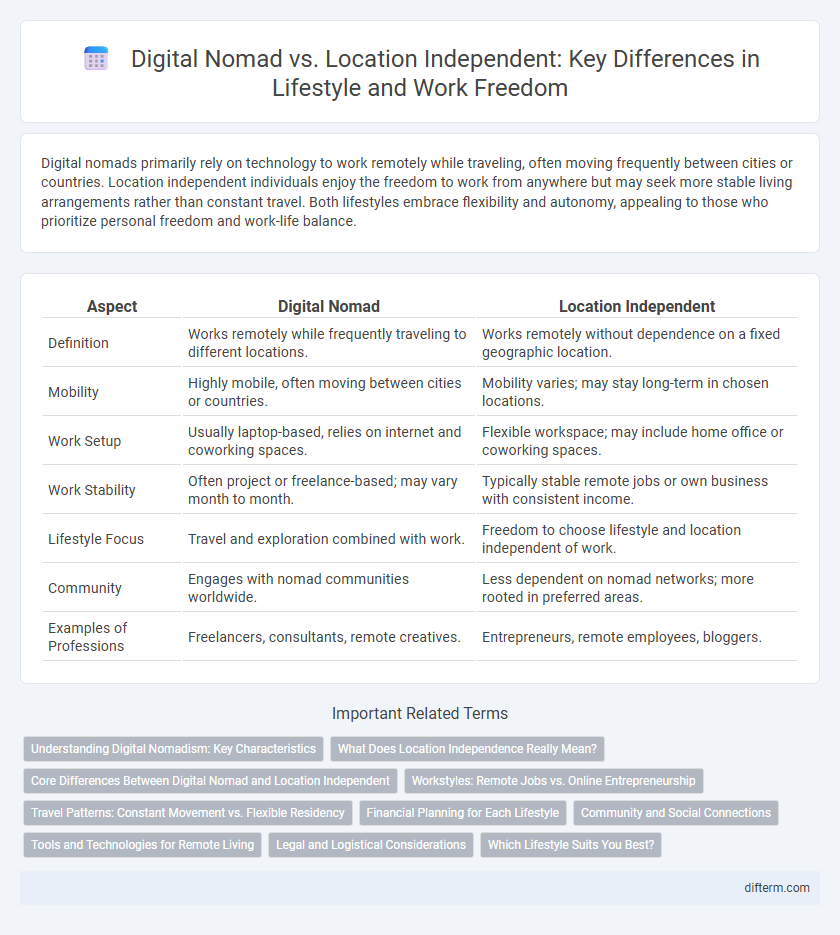Digital nomads primarily rely on technology to work remotely while traveling, often moving frequently between cities or countries. Location independent individuals enjoy the freedom to work from anywhere but may seek more stable living arrangements rather than constant travel. Both lifestyles embrace flexibility and autonomy, appealing to those who prioritize personal freedom and work-life balance.
Table of Comparison
| Aspect | Digital Nomad | Location Independent |
|---|---|---|
| Definition | Works remotely while frequently traveling to different locations. | Works remotely without dependence on a fixed geographic location. |
| Mobility | Highly mobile, often moving between cities or countries. | Mobility varies; may stay long-term in chosen locations. |
| Work Setup | Usually laptop-based, relies on internet and coworking spaces. | Flexible workspace; may include home office or coworking spaces. |
| Work Stability | Often project or freelance-based; may vary month to month. | Typically stable remote jobs or own business with consistent income. |
| Lifestyle Focus | Travel and exploration combined with work. | Freedom to choose lifestyle and location independent of work. |
| Community | Engages with nomad communities worldwide. | Less dependent on nomad networks; more rooted in preferred areas. |
| Examples of Professions | Freelancers, consultants, remote creatives. | Entrepreneurs, remote employees, bloggers. |
Understanding Digital Nomadism: Key Characteristics
Digital nomadism is defined by the ability to work remotely while traveling, using technology to maintain professional productivity from any location worldwide. Key characteristics include a reliance on digital tools, flexible work schedules, and a preference for mobile living spaces such as coworking cafes, short-term rentals, or shared accommodations. Unlike purely location-independent individuals who may remain stationary yet work remotely, digital nomads actively integrate travel into their lifestyle, continuously seeking new environments and cultural experiences.
What Does Location Independence Really Mean?
Location independence means having the freedom to work and live from anywhere without being tied to a specific geographic location, enabling individuals to design their lifestyle around flexibility and remote work opportunities. Unlike digital nomads who often travel frequently while working remotely, location-independent people may choose to stay in one place long-term while maintaining the ability to relocate at any time. This concept emphasizes autonomy over physical presence, supported by technology such as cloud computing, digital communication tools, and global internet access.
Core Differences Between Digital Nomad and Location Independent
Digital Nomads primarily work remotely while traveling frequently, relying on flexible schedules and co-working spaces to maintain productivity across various locations. Location Independent individuals maintain the freedom to live and work from anywhere, often settling temporarily in a single place without the constant movement characteristic of digital nomads. The core difference lies in mobility patterns: Digital Nomads embrace continuous travel, whereas Location Independent lifestyles prioritize long-term residence combined with remote work flexibility.
Workstyles: Remote Jobs vs. Online Entrepreneurship
Digital nomads typically engage in remote jobs that allow them to work from various locations using digital communication tools, prioritizing flexibility and travel. Location-independent professionals often lean towards online entrepreneurship, building businesses that can operate without geographic constraints, such as e-commerce, consulting, or digital content creation. Both workstyles emphasize autonomy but differ in income sources, with digital nomads relying on employer-based salaries and location-independent entrepreneurs generating revenue through self-owned ventures.
Travel Patterns: Constant Movement vs. Flexible Residency
Digital nomads typically embrace constant movement, frequently relocating to explore diverse cultures and work environments, whereas location-independent individuals prioritize flexible residency, balancing extended stays in select locations with the freedom to travel intermittently. Digital nomads often prefer cities with vibrant coworking spaces and reliable internet, supporting continuous mobility, while location-independent professionals may choose destinations based on lifestyle preferences, cost of living, and community connections for longer-term settlement. Both travel patterns reflect evolving work paradigms fueled by remote technology, yet diverge in their approach to stability and exploration.
Financial Planning for Each Lifestyle
Digital nomads often prioritize flexible income sources like freelance work or remote jobs to accommodate constant travel expenses, requiring dynamic budgeting that accounts for varying costs of living globally. Location independent individuals focus on stable, passive income streams such as investments or online businesses, enabling consistent financial planning regardless of physical location. Both lifestyles demand strategic savings plans and emergency funds tailored to unpredictable income flows and fluctuating expenses.
Community and Social Connections
Digital nomads often thrive within vibrant, co-living communities and coworking spaces that foster social connections and collaboration, essential for overcoming the isolation of constant travel. Location-independent individuals prioritize deep-rooted local networks and long-term relationships, embracing community integration over transient interactions. Both lifestyles emphasize social connectivity but differ in the balance between mobility and belonging.
Tools and Technologies for Remote Living
Digital nomads and location-independent professionals leverage cutting-edge tools like VPNs, project management platforms (Asana, Trello), and cloud storage solutions (Google Drive, Dropbox) to maintain seamless workflows across diverse environments. High-speed mobile hotspots, noise-canceling headphones, and portable monitors enhance productivity and connectivity while on the move. Emerging technologies such as AI-powered virtual assistants and collaboration software (Slack, Zoom) further empower remote living by enabling real-time communication and efficient task management.
Legal and Logistical Considerations
Digital nomads often navigate complex visa requirements and tax regulations tied to frequent international travel, while location-independent professionals may prioritize establishing a legal residence to simplify tax obligations and access local services. Both lifestyles demand careful planning of health insurance coverage and compliance with work authorization laws to avoid legal complications. Understanding country-specific digital nomad visas and bilateral tax treaties can optimize legal standing and minimize financial risks.
Which Lifestyle Suits You Best?
Digital nomads thrive on mobility, working remotely while frequently exploring new destinations, making this lifestyle ideal for those who crave constant change and adventure. Location-independent professionals enjoy the freedom to work from anywhere but often settle longer in one place, perfect for individuals valuing stability alongside flexibility. Assess your work habits, travel preferences, and social needs to determine whether an ever-changing environment or a balanced home base better suits your lifestyle goals.
Digital Nomad vs Location Independent Infographic

 difterm.com
difterm.com